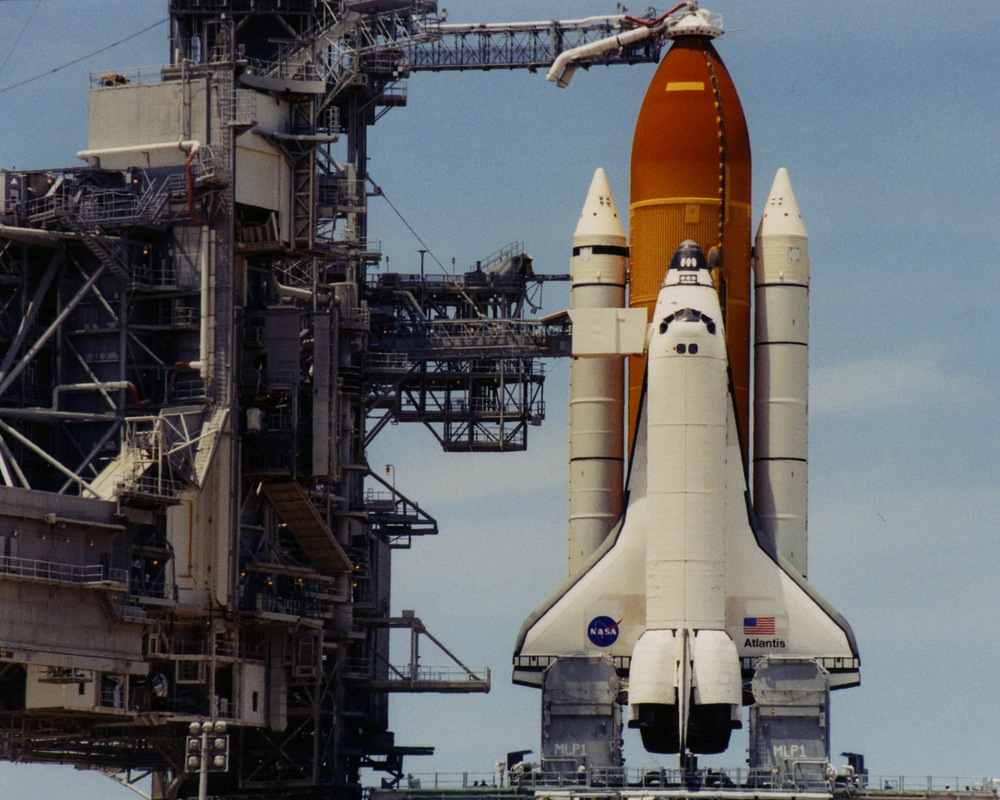
Ever since Sputnik 1, millions of American kids have dreamed of becoming astronauts—while the U.S. has spent billions of dollars on sending shuttles, people, satellites, and more out into the universe. But has our six-decade-long investment in NASA paid off, and is it truly a worthwhile use of public funds that are stretched thin on this planet alone? In advance of “What Do We Lose If We Don’t Go To Space?”, a Zócalo event, we asked people who write and think about space travel and policy, should the U.S. government be spending billions on going to space?

The question is usually posed in the positive: what do we gain by going into space? But posing it in the negative—by asking what we lose if we don’t go to space—is provocative and tantalizing in its ambiguity. Does “we” mean “the United States” or “humanity” in general, regardless of nationality? Does “space” include every place from the edge of the Earth’s atmosphere, 62 miles above sea level, to the fringes of the universe (if there are fringes)? Does “go to” mean a journey or a relocation, a dispatch of electromechanical devices or of human beings?
If the United States ceases to expand—human or otherwise—in space, we risk losing certain core values that have long been hailed as germane to America’s national identity. We risk losing the freedom and spirit of enterprise that have motivated expansion of the United States geographically and as a political, economic, and cultural force in the world. We risk losing curiosity and the appetite for knowledge about the inconceivably vast, varied, and mysterious universe. We risk losing the momentum of scientific and technological advances driven by space exploration and the sense of being able to meet extraordinary challenges with innovation. We risk losing the confidence that we can accomplish great feats when we commit to them, and the optimism of extending our reach into the unknown. Of course, “going to” space is not the only way to express these values, but they have been integral to our history in space thus far, and ceasing to be spacefarers would detach us from our past and diminish our national character.
If humans cease to go into space—literally go there—we also risk losing our future in a more fundamental sense. It’s possible that conditions on Earth may become so desperate that we can no longer afford, or we lose the will, to explore. But that may be exactly when we must be in space. If some calamity or catastrophe threatens the very survival of life on Earth, humanity better have the ability to relocate. Sending a Noah’s ark of evacuees to settle elsewhere will depend on spacefaring experience and technologies. Failure to be ready for such extreme scenarios would mean losing our basic human survival instinct and surrendering to the destruction of our future. Without yet knowing whether some kind of life exists elsewhere, humanity may be wise to preserve the option to launch into space some of the precious strains of life from our home planet to survive global disaster.
Valerie Neal is a space historian and curator at the Smithsonian National Air and Space Museum. She curated an exhibition and edited a book about the future of space exploration, both titled Where Next, Columbus?

America is knee-deep in very rich nerds, quite a few of whom have long nurtured dreams of going to space. Meanwhile, our federal government is knee-deep in a very serious fiscal crisis. This seems like a perfect time to let Facebook millionaires and PayPal billionaires foot the bill for space exploration and travel, while giving the taxpayers a break.
NASA is only about 0.5 percent of the federal budget (until the recent massive boom in spending, that figure hovered at around 1 percent). But that’s still $19 billion. And much of that money is being used inefficiently, from small boondoggles like NASA’s partnership with a science fiction publishing house to massive earmarks like the irrelevant yet expensive heavy-lift Space Launch System left over from the days of George W. Bush’s Constellation initiative. And keep in mind that right now NASA has no operational vehicles that can transport humans into space.
Meanwhile, there is a vibrant private sector that is already successfully shuttling cargo back and forth to the International Space Station for NASA—with human cargo to join the manifest shortly—as well as providing services to private clients such as satellite companies. If the government is to continue space spending in some form, it should be largely to encourage this burgeoning private sector. For about $300 million in taxpayer money (according to NASA’s own 2011 accounting), doled out in the form of contracts and prizes, NASA has managed to encourage the development of impressive new launch capabilities. Compare that with a cost of about $1 billion for a single trip to the International Space Station on the now-retired shuttle.
And the entrepreneurs who are making private space travel a reality aren’t lacking in long-term vision: Space X’s Elon Musk says he hopes to go to Mars as part of an early wave of colonization. Pure science is privately funded in many other (much less sexy) arenas, so why not let the philanthropists have a go at space? NASA programs like the Mars rovers get much better bang for their buck than other projects by the notoriously bloated agency. But at a surprisingly affordable price point of $2.6 billion, it’s easy to imagine a rich space nut funding such a venture.
Katherine Mangu-Ward (kmw@reason.com) is managing editor of Reason magazine and a fellow at the New America Foundation.

One of the traits that separate us from our animal cousins is the drive to explore. From the first tentative steps outside the cave to Armstrong’s historic first step on the Moon, humankind’s history has been enriched by brave steps into the unknown. We have conquered the land, conquered the air, and are making great efforts to conquer the depths of the oceans. It is a cliché, but space really is the final frontier. Our exploration of space began in earnest in 1957 with the launch of Sputnik 1 and has, in the last 55 years, taken humans to the Moon and manmade space probes to the edge of our solar system.
It’s very easy to argue that space exploration is essential because it has great benefits to us down here on Earth. We have space exploration to thank for the technology behind non-stick saucepans, smoke detectors, water purification systems that have saved countless lives in the third world, and even cordless power tools, all of which were developed for space travel. But the question of space travel and its burden on the economy runs deeper than inventions and technological advancement. It is about the deep-rooted human need for exploration—which cannot and should not be curtailed.
Mark Thompson is a presenter on the show Stargazing LIVE and a columnist for Discovery News and Sen. Find him at www.seamuslyte.com/mark_thompson/ and www.markthompsonastronomy.com, or follow him on Twitter at www.twitter.com/peoplesastro.

U.S. government spending on space has achieved much more than just landing astronauts on the moon and sending robotic explorers to Mars: its legacy has directly shaped modern life on Earth. Americans benefit from the history of rocket and satellite development every day as they use GPS navigation in their smartphones and cars, switch on satellite TV or radio, or listen to weather forecast predictions that use meteorological satellites to track extreme events such as hurricanes. The U.S. military relies upon satellites to guide its precision weapons and coordinate the movement of troops, aircraft, and naval fleets around the world.
Contrary to popular myth, NASA’s space program did not create Tang, Velcro, or Teflon. But the U.S. space agency’s mission needs have driven technological development on Earth—such as the trend toward evermore smaller, lighter electronics—and sometimes led to unexpected technological spinoffs. Nobody has fully figured out NASA’s impact in terms of innovation and economic benefits, but economic studies have estimated the per dollar payoff for U.S. space program spending to be anywhere from 3:1 to 21:1.
These payoffs seem likely to continue. NASA’s work to protect astronauts against deadly deep-space radiation and to stave off microgravity’s wasting effects on human muscles and bones—a necessity for human missions to Mars or the asteroids—could lead to better medical treatment on Earth. Robotic missions to explore possible oceans on the icy moons of Jupiter and Saturn will require smarter, more self-sufficient robots—possibly leading to artificial intelligence advances here as well.
But the best payoff of all for the government-funded space program is yet to come. NASA is supporting the growing commercial spaceflight industry by purchasing its services for resupplying the International Space Station and by signing contracts with private teams competing to land a robot on the moon for the Google Lunar X Prize. America may very well be on the way to boasting a thriving, self-sufficient space industry that not only creates jobs and economic benefits on Earth, but also establishes space mining operations or space refueling depots to support NASA’s future space exploration.
Jeremy M. Hsu is a senior writer at TechNewsDaily, a TechMediaNetwork website focused on technology news. He previously spent several years writing for TechNewsDaily’s sister websites, SPACE.com and LiveScience.

In fiscal 2012, NASA spent on the order of $10 billion on space exploration. Perhaps 70 percent of that total was devoted to human spaceflight, both to operate existing facilities like the International Space Station (which alone got $2.8 billion), and to plan future programs. The rest of the budget went to unmanned (a word that, in other contexts means emasculated or castrated) exploration—space based telescopes, robots on Mars, solar probes, and the like. Are we spending enough or too much on space exploration? Is the balance between human and unmanned appropriate? Scientists, politicians, and interested citizens have been arguing those questions for decades.
Besides the direct beneficiaries of NASA’s programs—engineers, scientists, government administrators, aerospace contractors, and others—there are apparently many Americans who view space exploration as a worthy, even noble, goal of humanity. At one extreme are those who see planetary exploration and even colonization as humanity’s manifest destiny. At another are more economically or environmentally minded people who see space exploration as providing access to a potentially unlimited source of natural resources (especially certain strategically important metals found in asteroids), or to future habitats for a species that is ruining its home planet. A third perspective views space exploration as intrinsically worthwhile, for intellectual, aesthetic, or even spiritual reasons.
All of these are valid, of course, but they are also largely post-hoc rationales for a space program originally justified and funded during the height of the Cold War for military and geopolitical reasons. Landing on the moon was cool, but if we hadn’t been trying to show the Soviets—and the world—that the U.S. was truly the Master of the Universe, then one wonders if the nation would have been so enthusiastic about spending on the order of $170 billion (inflation-adjusted 2005 dollars) for the Apollo project—or about three times today’s entire annual government investment for all non-defense science and technology.
Since Apollo, successive major NASA initiatives (especially the space shuttle and the space station) have been justified by the government as “the next logical step” in building humanity’s capacity to explore space. One might ask “logical step toward what?”, especially given that our reach into space, at least through human spaceflight, has contracted rather than grown in the four decades since a man last hopped on the moon. To a considerable extent, today’s national space program needs to be understood not as a vision for the exploration of the unknown, but as a relict of the budgetary, bureaucratic, and political momentum created by the initial investment in Apollo, an investment made for reasons that have almost entirely disappeared in the intervening years.
In a world that doesn’t exist, one might restart the space program from the ground up, building an entirely new federal program—one that’s lean, risk-seeking, efficient, and not ham-strung by incumbent interests that depend on NASA’s current organization of programs, contractors, and political patrons. One might canvass the interested public to get a sense of what vision of space exploration was most exciting to a wide variety of citizens, what they’d be willing to pay for it, and where the money would come from. Higher taxes on the rich? Cuts to Medicare? Even as an act of imagination, it’s hard to see how the nation’s space exploration program can possibly escape from the political and technological inertia of its Cold War origins.
Daniel Sarewitz is co-director of the Consortium for Science, Policy and Outcomes, and Professor of Science and Society, at Arizona State University.

Government must safeguard its people. The U.S. government should spend bountifully on space for this reason.
An outer-space object like that which killed the dinosaurs could strike Earth again. This would cause mass suffering and could even end all human life. We can only escape this anguish by detecting an incoming meteor, asteroid, or comet early, and then deflecting or destroying it.
Despite Hollywood’s heroic visions, mankind does not today have the technology to avert an impact.
But it is within reach.
This capability will not come cheap, or overnight. It will require an investment of billions of dollars over dozens of years. The U.S. government is the only organization on Earth with the resources and technical capacity to organize such an effort. Acquiring the requisite engineering expertise will take many years of trial and error. The sooner we start, the safer we will be. Robots cannot react to unexpected circumstances, and so are not up to the job.
A manned space program also boosts the nation’s morale, though it is tough to measure this effect. The vast crowds that turned out across the country for the space shuttles’ valedictory tour—in New York and Los Angeles, in Washington, D.C. and Houston—prove that spaceflight’s ability to inspire did not die with Neil Armstrong but is alive and well.
The spiritual case for a space program is strong. The potential economic upside is as unbounded as space itself. Reasonable opponents of space exploration can argue that similar benefits could be more efficiently achieved on Earth.
But no sane person wishes for humanity’s end. The chances of an impact are small, but real. Generous government funding of manned space exploration, of an order not seen since the end of the Apollo program in 1972, is our only insurance against worldwide ruin.
Konstantin Kakaes, a former Economist correspondent in Mexico, is a Schwartz Fellow at The New America Foundation in Washington, D.C.



